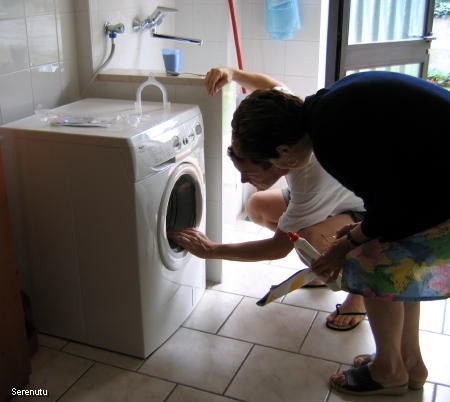Buon Termine
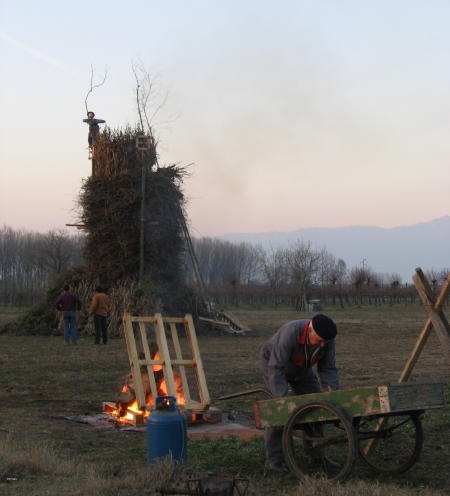
Across the dark fields I can hear little bursts of repercussive explosions. Overeager pyromaniacs are testing out the minor bombs. The big ones, such as this year’s most popular model “La Testata di Zidane” (the Head Butt of Zidane), will be set off at midnight, willy-nilly into the darkness. Tomorrow we will get an official count of missing hands and feet across Italy along with a death tally. This follows a week of images on television of confiscated illegal fireworks. The images, always from Naples, look suspiciously anonymous. I think it is the same photo of the same cache of weapons shown year after year to pacify the public, for there always seems to be enough to go around for everyone. We stay indoors. Luciano has impressed upon me the danger of moving about outside. As we prepare for our New Year’s celebration with the parents, I imagine us crawling, boot camp style, belly to the ground, elbows pulling us forward through the explosion-lit sky to the little garden gate next door. I hope they can provide cover.
The Veneto is now halfway through the Christmas Season. The nearby village of Santa Lucia has wrapped up the 1346th annual December Festival. (Yes, 1346th.) The tree hawkers in Treviso have packed up and left. The streets are calmer, almost sleepy. The department stores are subtly shifting displays to a New Year’s theme as the red and gold remnants of Christmas are moved into an increasing smaller corner. No sales though. That happens all at once on January 7th, the day after the Epiphany.
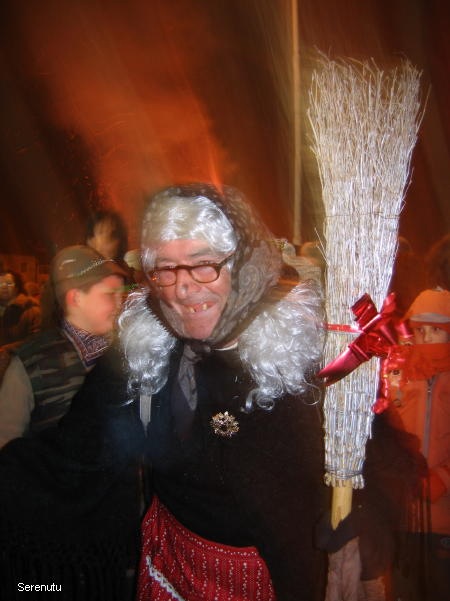
In the supermarkets the mountains of pandoro and panettone cakes are being replaced by little plastic stockings filled with candies. These will be delivered by the Befana, a personage, who looks for all the world like a witch, to well-behaved children on the night of the 5th. I understand the connection to the 6th which is the legendary night on which the kings of the Magi arrived in Bethlehem carrying gifts. But why “befana” and why a witch? I asked Luciano for clarification.
“Why is the character a witch?”
“You know, all my childhood I waited for this character who brought me good things to eat. I did not ponder her existence. When I learned that it was really my parents leaving the sock, I lost all interest.”
“Ok, but the word for witch in Italian is strega. Why Befana? Besides the obvious connection to the word epiphany, what does befana mean?
“It means old lady with a broom.”
Obviously I will have to speak with Luciano’s mother, Anna Maria, to get the lowdown.
Luciano told me of how, as a child, he left a glass of wine with a piece of bread for Saint Nicolo and a pile of hay for his donkey outside the kitchen door on December 6. This is the traditional night for gifts for children and the official start of the season.
“You never left anything for the Befana?”
“Nope. She came by herself.”
On the way home today we passed a group of farmers gathered in the wan afternoon sun around a makeshift table in a field. One poured wine from a large demijohn. Behind them, rising to audacious heights from the crisp cornstalk stubble, was sturdy scaffolding newly-built of solid beams the thickness of telephone poles. This will serve as support for the superstructure of fuel: wooden pallets, branches, small trees, broken chairs, anything combustible. At the top of this edifice a figure of an old lady, perhaps with a broom in hand, will be placed. Somewhere nearby there will be a baby placed to represent the New Year. On the night of January 5th someone will toss a match into this structure which is, for all intents and purposes, a sacrificial pyre and normally sober and levelheaded townsfolk will drink spiced wine and dance about the old lady as she goes up in smoke. This scene occurs all over the Veneto with towering bonfires that reach as high as thirty feet into the air and whose remains will smolder well into March.
Far removed from the high jinks of her fellow Marenesi, la Nonna sits quietly at the kitchen table. I believe she has agreed to come to the celebration tonight. I certainly hope so as the party would just not be the same without her blowing the noisemaker at the television. Recently she has been going to bed earlier and earlier. Since her visit to the hospital last month she is convinced that she is 100 years old. Yesterday Anna Maria commented that la Nonna’s hair was growing pretty slowly.
“What do you want? It is 100 years old!”
“Nonna, you are 94.”
“Oh.”
Last week she announced that she was tired and wanted to die. She closed her eyes and refused to open them.
“Nonna, come on!”
“I am old. I am 100. I want to die.”
“Nonna, you are 94.”
She opened one eye. “Really?”
“Yes.”
“Oh.” Disappointed, she opened her eyes and finished her lunch. In her newly found and imaginary centenarian hood, she is calm, regal and just a little smug. So we have decided that, even though she turned 94 a month ago, if she wants to be 100, so be it. Who are we to disagree?
We wish you all a Happy New Year!
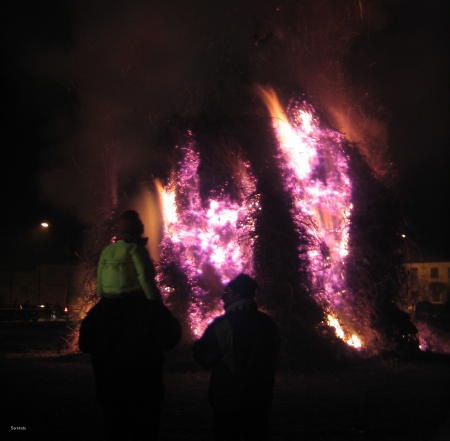
Le Pecore Di Natale

Last week 200 shepherds were stolen from the public nativity scene in front of a church in Naples. The foot-tall figures, hand carved and valued at over 3 million euro, disappeared overnight. The crime is shocking, but not original. A nativity theft seems to happen every year; usually it is the Baby Jesus who is purloined. Happily, as headlines announced today, all 200 shepherds were found abandoned in a field in a nearby village. Too hot to hock perhaps?
~~~
My reluctance to leave Mareno di Piave each morning for fear of missing something is well founded. Everyday I wave goodbye to Luciano, who works at home, and drive off to Treviso knowing that there is a good chance that he would have a story to tell me.
Last week he sat with La Nonna as he does every Wednesday while his parents go out for their weekly breakfast excursion.
“Nonna, tell me a story. Something about your life.”
“That would be nice, but everything went out of my head through that hole.”
La Nonna had taken a fall in August and cut her head. Since then she sometimes has trouble remembering exactly who Luciano is and occasionally talks about her father as if he were in the next room. He isn’t, as far as we know.
They sat in companionable silence while Luciano worked until he caught a movement outside the window in the corner of his eye. It was a beat up pick-up truck creeping down the street, the driver leaning out the window, gazing backwards.
“Huh,” said Luciano, mildly curious. He pondered for a moment a reason why the man should be driving so slowly. La Nonna calmly gazed out the window. Suddenly the significance dawned on him and he jumped up.
“NO!” He ran out the back door, grabbing a broom on the way, and loped around to the front the house- and face to face with a slow-moving vast sea of destructive, bleating, dim-witted sheep. There were hundreds of them making their ruinous way from the summer pastures in the mountains, filling our little lane like water spilling over stones. Shouting and waving the broom, Luciano defended my flower garden and his parents’ ivy. He swung at the sheep nibbling at his father’s grape vine, then ran back to smack at the sheep tramping through my newly planted tulip bulbs. Cursing and brandishing his weapon against the sea of slowly bobbing, wooly backs, he fought the surge in a dance of defiance.
Meanwhile in Treviso, oblivious, I stood at the windows of the priest supply store gazing at the most endearing miniature sheep in the middle of a nativity scene. The store, right next to the main cathedral, is exploding with these scenes or presepi. Normally this shop provides your standard Catholic needs: myrrh, communion wafers, robes, miters. You know, the normal stuff. At Christmas however, you go there if you need a Baby Jesus or a camel for your home presepio. There are even mechanized characters with which to populate an entire village. One could purchase a sheep-shearer who holds a slowly writhing sheep with one arm and pulls a hank of fleece from its back with the other, over and over again. A woman snaps up and down washing the same stiff, blue shirt, forever. I leaned in closer to look at the adorable little lamb’s face.
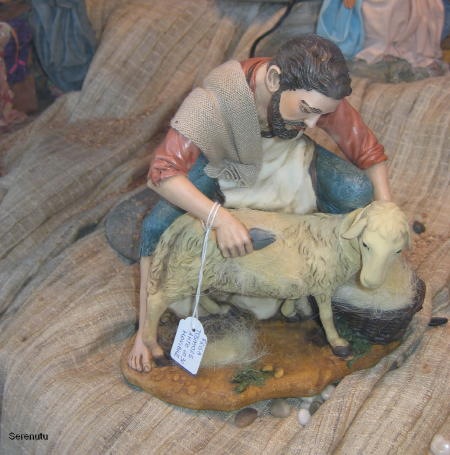
Back in Mareno the sheep dogs trotted past Luciano and his wildly swinging broom, glancing at him as a preoccupied executive might notice a single noisy protester in front of the office. They blinked in mild curiosity and surprise, then trotted on with heads lowered, weaving through the foolish flock. The throng, easily avoiding the broom, bleated placidly at Luciano, but he parted the flow which slowly began to ebb. The last few confused beast skittered past him, leaving him panting, spent, and furious
I entered the shop and walked over to the sheep shelf, looking closely into their painted sheep eyes. In the silence of the store I heard a “tap, tap, tap” and looked around. A tiny little cobbler was swinging his tiny little mallet at a plastic boot for eternity. Or until someone cuts the power. The shopkeepers do not hear it any more, I imagine. Next to the cobbler, a man danced in a miniature vat. I looked closely and could see that he was crushing grapes, his poor little wire knees showing through his farmer pants. He was looking up at me with badly painted eyes and I saw torment. Whir, whir, whir, he stomped his fake grapes and stared wall-eyed at the ceiling.

Sometime in the thirteenth century Saint Francis created a presepio to commemorate the simplicity of the birth of Christ, making Italy the birthplace of the nativity scene. My student Carlo patiently explained its significance to Italians, which is an older, certainly more traditional symbol of Christmas than the tree. He pointed out that the three kings showed up twelve days later, on January 6th so they are not placed in the scenes until then. It is true. I have looked closely at the presepi in the shop windows and indeed there are no kings yet.
“I’ll take this one” I said pointing at the most expressive of all the sheep. The shopkeeper scooped up the minute animal with the curly coat, wrapped it up quickly in brown paper and dropped it in a discreet bag. I left the winemaker to his fate.
Luciano silently swept the last remnants of sheep off the front terrace and went back into the kitchen where he had left la Nonna. Again they sat in silence as he resumed work. An hour passed, the clock ticking in the warm stillness. Then La Nonna shifted, turned, and gazed at Luciano serenely.
After a moment she asked, “Was that you making that noise?”
The Market Tree

"Serena, it is me or the geranium."
Luciano issued this ultimatum as I walked in the door last week. I had moved the plant inside for the winter so it would not freeze solid and become, like my geranium from last year, a mushy mess to toss in the nearby field. Luciano hates the smell and would like nothing better than see it become mush. I secretly think he contributed to the last plant's demise.
"Let me think about it." I said as I hung up my coat. I knew he wasn't serious, but I will have to keep an eye on him. Later, I went next door to say hello to La Nonna, Giancarlo and Anna Maria and to borrow a cup of flour. I casually recounted Luciano's threat. Both parents stopped what they were doing, their heads snapped around to look at me. La Nonna remained calm as she probably did not hear me.
"What did you decide?" said Anna Maria.
"I am still thinking."
Eyes wide, they both began offering ideas for non-stinky plants, although Anna Maria agrees with me: geraniums do not stink. La Nonna was nonplussed. I asked Luciano later if he would go next door in his pajamas and holding his toothbrush and say in his best downcast voice, “She chose the geranium.”
“No, Serena. We have weak hearts next door.” Luciano said.
With this loathing of the geranium and general indifference to our other plants, Luciano’s affection for our ill Christmas tree has come as a surprise. The tree sits in the garden and appears to have died from the inside out. It has optimistic green branches attached to a very brown, dried trunk. I have been quietly mentioning its condition to Luciano who has a strange kind of attachment to the tree, purchased three years ago at the Treviso market. He does not want to discuss the illness, reluctant to admit the inevitable.
The fact that it has survived at all is a minor miracle since the roots are routinely cut on trees sold at the market in order to fit nicely in the standard burlap bag. Somehow, this one had defied its original owner’s indifference and flourished. After my putting it in a swank terra cotta pot, it sent out hopeful chartreuse shoots of new growth each spring and survived two sweltering summer. Then the sickness came.
I want to set it free in a field, not just chop it up and toss it. But as attached as he is, I cannot convince Luciano to help me go into someone’s field, dig a hole and drop the darn thing in. His reluctance is understandable; it is almost like tossing a Pamper. I was steeling myself to do it alone, when Giancarlo brought it up at lunch. Luciano’s family doesn’t “do” Christmas in the traditional excessive, over-the-top sense. They decorate the kitchen with subtle little Santa Clauses, shake hands on Christmas morning and have a nice dinner. They steer clear of the orgy of gifts, carols, and certainly, a tree. I come from a family of nine children whose only limitation for a Christmas tree, cut with great fanfare in the woods surrounding our house, is the height of the room.
"So, the tree is not doing well? I heard that you wanted to get rid of it."
"Yes, I want to set it free."
"No, people don't like that. A sick tree can bring bugs. I'll take care of it."
With that, the tree is doomed. It will be cut up and will disappear. I asked Luciano if we shouldn't help and he asked, "Can you really do it?"
“No.”
I looked out the window at the little tree and felt guilty. Quietly and efficiently, Giancarlo would dispatch the tree when I am not looking and I would return to find a cleaned out pot. The image of the scrawny, rejected tree in “A Charlie Brown Christmas” keeps popping up in my mind. I felt evil, but at the same time, I was fantasizing the lush, jaunty new tree I will buy to replace it.
This morning I was stretching outside, getting ready for a run. I looked away from the tree, overwhelmed by the image of its future. Anna Maria came around the corner.
“You know, I have been looking at this tree and I think you are both crazy to want to kill it. Look, you put a few lights on it, a few ornaments here, and it will be fine.”
For a woman who has never had a Christmas tree in her life, she made a good case, albeit a sentimental one. But I know she speaks from her ever present practicality: why unnecessarily spend money replacing something? Especially on such a useless item as a Christmas tree. Luciano leaned out the window and nodded in agreement, revealing nothing. The man plays it close to the chest when it comes to plants.
I had to admit that it did look a little better. We had had two days of heavy rain and let’s face it, we all looked a little perkier. Were the branches a little greener? Ok, I said. And just like that, the tree has a reprieve. We will dress it up and pretend that it is the prettiest tree in the world and maybe, just maybe it will reward us with a rebirth in May and spring back to life.
Later that night Luciano quietly said, “I am glad we saved the tree. It was my first Christmas tree.”
“Yes, but if it stays brown and ugly, next year we will throw it in the field.”
“I hope one day when I become brown and ugly you won’t throw me in the field.”
Ok, so he was paraphrasing something I said last spring, but it got to me and to his credit, he did not pull out this card until after I had decided to keep the tree. So I kissed him and said, “Never.”
The tree has one year. Then it gets the axe.
Laundry
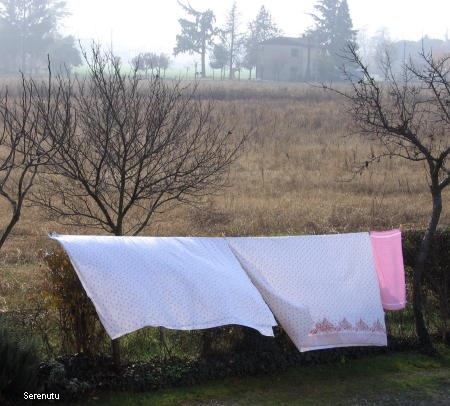
Luciano purrs a little when the sun is just right and the breeze is wafting through the clothes. He adjusts a clip and bends down to inspect a stubborn stain on a sock. He shifts the drying rack to catch that perfect breeze and then backs away from the gently flapping laundry. Doing laundry is his Zen. He finds satisfaction and peace in the perfectly folded clean t-shirt. He announces with great seriousness, “I am thinking of doing a color load. Is everything you want washed already in the hamster?”
(He had trouble with the word “hamper” and this word stuck. I like it better.)
Washing clothes in Italy is a commitment. Most homes have no dryers since they use up an inordinate amount of energy. In the summer, this is no problem. Everything dries in ten minutes hung outside in the heat. In the winter, however, it could be a three day project. The wash cycle alone takes two hours.
“Two hours?” I was shocked when I read the directions for the first time, three years ago. “That is like taking the clothes out for dinner and a movie! Why so long?”
At the time, Luciano did not know. His mother washed all his clothes and they magically appeared, crisply folded and ironed on his dresser.
Once the clothes are put in the machine and the door closed, there is no going back for two hours, as the laundry is tossed and turned…and then tossed again, this time with suds. And then again, without. I once started a load and then heard a clunk-ca-clunk! I peered into the door and there, pinned to the glass, was my watch. I could do nothing but look on helplessly as it was wrenched back and forth through the rinse cycle. It survived and now runs even better, having been so thoroughly cleaned. My passport is also a lot cleaner and its very survival a testament to the high standards at the US Passport office.
In our new life together, Luciano has fortunately assumed the responsibility of laundry. He must have had a gut feeling that I might not put into it the same passion that he does. His mother’s influence, no doubt. She is a miracle worker when it comes to washing. She has gotten stains older I am out of linens that I had deemed rags. When we moved into our new house and before our new machine arrived, she did our laundry. “It’s ok. I can do it. For now. But get a machine.”
The new machine arrived, six hours after we bought it from the guy up the street. Luciano and Anna Maria pored over the directions and then fired it up with a test load of socks. From that day until now I have touched it, maybe, twice, which is a good thing, given my tendency to get frustrated at the system and forget items in pockets. Luciano carefully empties the hamster and meticulously pins the clean clothes to the rack and meditatively positions it in the sun. So what if everyone in Mareno knows what kind of underpants I wear? I love watching Luciano fold them, his large hands magically rendering them minuscule. I know I will come home and find them in a miniature fresh smelling pile on the dresser, folded with knife edge precision.
Yesterday, Luciano had to leave after lunch before he had a chance to hang the clothes. He asked if I could do it and I carefully pulled the damp clothes from their time capsule and into a wicker basket. Importantly, I walked out to the front of the house. The afternoon was warm and hushed. In the distance, a dog barked. With the thin November sun on my back, I clipped running shorts and socks, spreading them out on the rack’s white vinyl cords. Then I stopped for a moment. In the warm stillness of the afternoon, with the damp clean-smelling clothes under my fingers stretched out to dry, the mild breeze moving everything in a gentle dance, I had a moment of absolute, utter peace.
I understand now.
